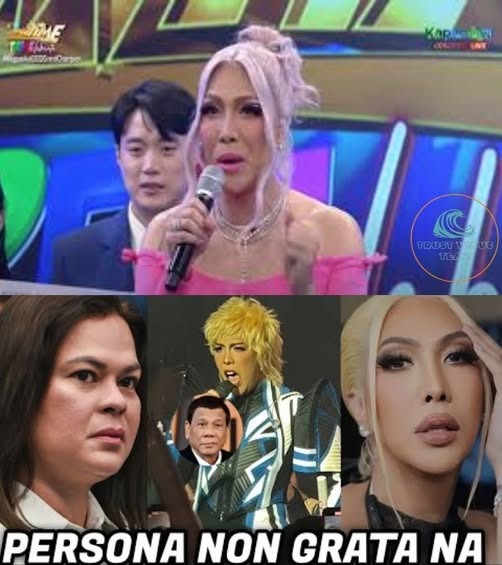Vice Ganda Declared Persona Non Grata in Davao City Over Alleged Insult Toward Former President Duterte During Concert Appearance
Date: August 10, 2025
Popular comedian and television host Vice Ganda has been declared persona non grata in Davao City, following uproar over an alleged remark made during a recent concert that many local officials and residents viewed as disrespectful toward former President Rodrigo Roa Duterte (FPRRD).
The declaration, issued by the Davao City Council, comes amid intense online debate and widespread media coverage. Supporters of Vice Ganda argue for freedom of expression, while critics emphasize the importance of respecting public figures, especially in regions with strong political and cultural ties to the former president.
What Happened During the Concert?
Vice Ganda recently performed in a live concert held in a neighboring city, which was attended by thousands of fans. According to viral video clips circulating online, Vice made a joking reference that some interpreted as a veiled insult directed at former President Duterte.
While the remark was delivered in a comedic tone typical of Vice’s performances, many Davaoeños viewed it as distasteful and disrespectful, especially considering Duterte’s roots and enduring influence in Davao.
Though no exact quote has been officially confirmed in the declaration, several councilors cited the “demeaning tone” and “public insult” as basis for the decision.
Davao City Council’s Statement
In a resolution passed earlier this week, the Davao City Council officially declared Vice Ganda as persona non grata, citing “disrespect toward a revered leader and an affront to the sensibilities of the people of Davao.”
“Public figures, especially those with influence, have a responsibility to exercise caution when speaking about national leaders—past or present,” the resolution read.
While the declaration does not carry legal weight in terms of arrest or detention, it serves as a symbolic ban, indicating that the individual is not welcome in the jurisdiction.
Vice Ganda’s Camp: No Official Response Yet
As of this writing, Vice Ganda has not released an official statement responding to the declaration. The comedian has continued regular programming on television and social media but has avoided direct mention of the Davao controversy.
Some of Vice’s close colleagues have hinted that the comment was taken out of context, and not intended to insult anyone personally.
“Vice is a comedian—satire and exaggeration are part of the performance. It’s unfortunate that the joke didn’t land well with some,” one anonymous source shared.
Persona Non Grata: What Does It Actually Mean?
The term “persona non grata” is Latin for “an unwelcome person.” In the context of local government, it is largely symbolic, without the force of criminal law. The resolution expresses a collective sentiment, typically used to condemn actions or statements considered offensive by the local population.
In practical terms, a persona non grata resolution may:
Discourage the person from visiting or performing in the area
Lead to cancellation of scheduled appearances or partnerships
Spark public criticism or boycotts
However, it does not prohibit travel, nor does it authorize detainment.
The Public’s Reaction: Divided and Emotional
The issue has sparked polarizing reactions online. Many Davaoeños and supporters of former President Duterte have rallied behind the resolution, calling it a necessary defense of local pride and respect.
“Davao is Duterte country. You don’t just come here and mock him. That’s our former president,” wrote one supporter on social media.
Others, however, raised concerns about freedom of expression, especially when it comes to comedy and satire.
“Persona non grata over a joke? Are we criminalizing humor now?” a netizen posted, gaining thousands of reactions.
Media personalities, comedians, and even legal experts have since weighed in, pointing out the fine line between offense and satire, and the growing sensitivity toward political commentary in the country.
The Duterte Factor: Still a Strong Force
Though Rodrigo Duterte stepped down from office in 2022, his influence remains deeply rooted in Davao City, where he previously served as mayor for over two decades. His family continues to hold political positions in the region, and the local sentiment remains strongly aligned with his legacy.
This context adds weight to the declaration, making any perceived insult not just a personal jab—but a direct affront to the values of a politically unified city.
What Happens Next?
With no formal legal consequence tied to the declaration, the next steps are mostly social and reputational. It remains unclear whether Vice Ganda will continue to perform in Mindanao in the near future, or if tour stops will be adjusted to avoid further backlash.
Events and bookings in Davao may now face local resistance if Vice is involved, although nationwide support for the comedian remains strong.
Meanwhile, fans are calling for both sides to de-escalate and move forward, with some hoping for clarification or reconciliation, possibly through a public statement or dialogue.
Final Thoughts: The Cost of Comedy in Politically Sensitive Times
This incident once again highlights the delicate balance between humor and offense, especially in a nation where political identity runs deep and emotional ties to leaders remain personal.
Vice Ganda’s case is not the first time a comedian has faced consequences for political jokes—and likely won’t be the last. But it raises important questions:
When does satire cross the line?
How do we protect both dignity and freedom of expression?
And how do public figures adjust to the evolving expectations of sensitivity and accountability?
As the dust settles, what’s clear is that words matter, and so does context. In today’s digital age, a single comment—whether intended as humor or not—can ripple into controversy in moments.
Related Articles (Titles Only)
“Persona Non Grata in Philippine Politics: What It Means and How It’s Used”
“Vice Ganda and the Power (and Risk) of Comedy in Political Times”
“Why Duterte’s Legacy Remains Strong in Davao City”
“Freedom of Expression vs. Cultural Sensitivity: The New Showbiz Balancing Act”
“When Celebrities Clash with Local Politics: A Look Back at Past Persona Non Grata Declarations”
